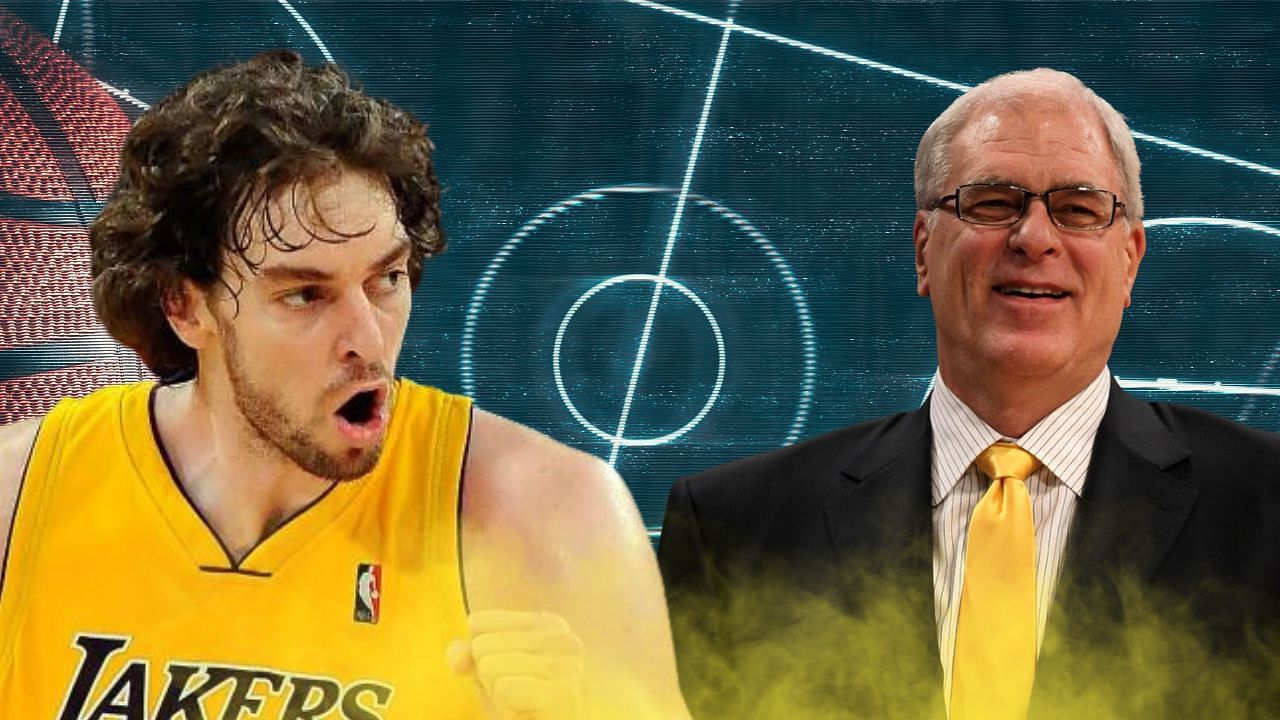
Exclusive - 'Pau Gasol was the perfect fit with Kobe Bryant': Phil Jackson, Jeanie Buss, Mitch Kupchak reflect on Spaniard's decorated Lakers career
After spending the past year showing frustration about the Lakers’ playoff shortcomings, Kobe Bryant finally became happy.
The Lakers had just acquired Pau Gasol from the Memphis Grizzlies on Feb. 2008, prompting Bryant to visit Gasol in his hotel room and outline his championship expectations. In his Lakers’ debut, Gasol immediately showed he would become the missing piece to the franchise’s championship puzzle.
While Gasol posted 24 points on 10-for-15 shooting, 12 rebounds and four assists against the former New Jersey Nets, Bryant approached Lakers coach Phil Jackson and expressed giddiness about his new teammate.
“Kobe came to the bench and said: “Great, we’ve got a big guy that can run the court, catch, and finish on the break!” Jackson wrote in an e-mail to Sportskeeda.
Bryant also predicted to Jackson, “we’re going to the Finals!” Jackson laughed, but Bryant maintained years later he was “dead-ass serious.” He was right. Following the Gasol acquisition, the Lakers appeared in three consecutive Finals that included a loss to Boston (2008), a win against Orlando (2009) and a win against Boston (2010).
During his 6 ½ seasons with the Lakers, Gasol also experienced turbulence. Following the 2011 NBA lockout, the Lakers included Gasol in the Chris Paul deal that the NBA soon rescinded. Gasol became linked in various trade discussions both real and imagined. And Gasol experienced varying roles and injuries under Lakers coaches Mike Brown (2011-12) and Mike D’Antoni (2013-14) before joining the Chicago Bulls as a free agent.
Nonetheless, Gasol will be inducted in the Naismith Memorial Basketball Hall-of-Fame on Saturday because of both his success in the NBA (two championships, six NBA All-Star appearances) and with the Spanish national team (two Olympic silver and one Olympic bronze medal). The Lakers also retired Gasol’s No. 16 jersey in March because of his role with the franchise’s two NBA title runs and his strong bond with the late Bryant.
Sportskeeda interviewed various members of those teams about Gasol, including Jackson, Lakers governor Jeanie Buss, former Lakers general manager Mitch Kupchak, former Lakers head athletic trainer Gary Vitti, former Lakers coach Mike Brown (current Sacramento head coach) and former Lakers forward Luke Walton (current Cleveland assistant coach).
In a wide-ranging discussion, below are reflections on Gasol’s role to the Lakers’ two NBA title teams, his chemistry with Bryant, how he handled the nixed Paul deal and different roles and more.
EDITIOR’S NOTE: The following interviews have been edited and condensed. Gasol’s comments were made in group settings both shortly before his Lakers’ jersey retirement and his Hall-of-Fame induction. The other interviews were conducted exclusively with Sportskeeda.
Jeanie Buss, Mitch Kupchak, Phil Jackson and Pau Gasol look back at his Lakers tenure
What was your reaction toward the Lakers acquiring Pau Gasol midway through the 2008-09 season?
Gasol: “We had some competitive seasons [in Memphis]. I think we made our city excited and proud and then things kind of went another way because of circumstances. Ownership was selling the team, so that kind of froze all our chances to get better and then another door opened. An opportunity occurred and I was traded to the Lakers. It was a big opportunity for me and it changed my life. I’m so thankful for it.”
Jackson: “We had discussed the trade for Pau a season before. My reluctance was that he wasn’t a defensive center and protecting the lane was a priority. However, Andrew Bynum was an important member of the team and allowed Pau to play both positions when the Lakers won back-to-back titles. Pau’s ability to play both positions really made the Lakers a potent offensive team.”
Kupchak: “After we did the deal, Kobe called me up. He was excited like a kid. Phil was kind of stoic. He had no idea we were going to do the deal until the night before. I told him that I thought the next day that we’d be able to get a deal done. He just kind of looked at me and said, Huh?’ It was an honest look. He said, ‘Really?’ I said, ‘Yeah but it’s not done yet.’ Then he turned around and walked away. He took it one way and Kobe took it another way.
In the negotiations, Memphis kept asking for more and more with another first-round pick, $3 million and then wanting one or two second-round picks that we had the rights to. It seemed like it was never going to end. But when the story broke, there was a lot of talk that it was lopsided. Personally, I wasn’t comfortable because Chris Wallace, the GM at the time, I liked him and respected him. It didn’t seem fair. Low and behold, two years later, that second-round pick that they wanted that we gave them turned out to be Marc Gasol. Something at the time seemed so lopsided ended up being pretty fair. That’s the NBA. There’s often an immediate perception, whether it’s the draft or a trade, especially with young players. You really have to wait for a couple of years. We were in the hunt for a championship. Memphis was not. They were entering a rebuild. There are different ways to go about it. We got what we needed. A year or two later, they got what they needed.”
Buss: “It was a trade that was a well-kept secret in the organization. My father had talks at the time with Michael Heisler (the Grizzlies owner). My dad had a really good relationship with him. There were conversations that were had and executed on. What at first seemed like a trade might’ve seemed one-sided, obviously as time went on, Marc Gasol became a very important player for the Memphis Grizzlies. It really was a fair trade. We got a great talent. But we gave up talent. Obviously with the comments by somebody like [Dallas Mavericks owner] Mark Cuban or [San Antonio Spurs coach] Gregg Popovich, I believe if they had been tipped off, that trade was going to happen. They would offer or convince Memphis not to make the trade. Thankfully, that didn’t happen.”
Walton: “Pau was the perfect fit. He was the perfect player. He was the perfect teammate with what our group needed. - being that second option next to Kobe, his skillset fitting into Phil’s triangle offense and the way his personality was. It was just unbelievable with how skilled and intelligent he was that he could just come in right away and make the impact that he made. Ultimately, that allowed us to go to three straight Finals and win two of them. None of that part of the chapter happens without Pau joining and ultimately helping those Lakers teams.”
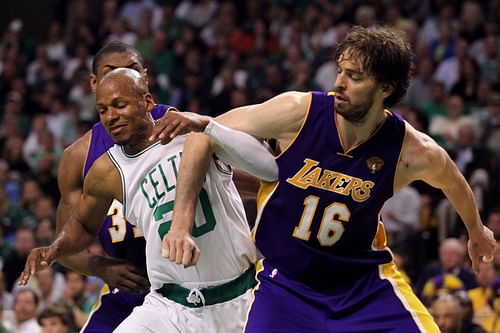
When the Lakers acquired Pau Gasol, did you see him at the time as the missing piece to make a championship run?
Jackson: “He was gifted, but hadn’t been on a team that had won a playoff game in his first 5/6 years as an NBA player. He enjoyed winning and loved playing with competitive players.”
Kupchak: I remember when we brought him to LA and we went to meet with him when he was getting his physical. Pau talked about his back and that it was an emotional time for him to be traded. He had a back problem. Even then, you say, ‘Oh boy, is this going to work?’ But then that first game, it was seamless. I’m watching it on TV in LA, and you could tell they were a different team. It just got better and better and better. When you’re doing the deal, sometimes you just don’t know. But there’s no doubt that he was a Godsend when we traded for him. Andrew Bynum had just gotten down. The moment we got Pau, we just took off.”
Buss: “Pau came into the team that was running the triangle offense. He picked up the offense in three days. He didn’t miss a beat. He was the perfect player. As Phil explained to me, as an organization you decide what style of play you want to play and what team you want to be. Then you hire a coach that runs that style. Then you draft a team or sign players that fit that style. Here was the ultimate player that fit so perfectly in what we were doing. He fit with Kobe and with what Kobe wanted to accomplished.”
Walton: “When we traded for Pau midseason, I knew how good he was from competing against him. But I assumed it would’ve taken longer for him and ultimately us because of how complex the offensive system was that we ran. I assume that as soon as Pau figured out all of the nuances of it and how to orchestrate it that we would be one of the most elite teams in the league. Within the first four or five games, we watched him execute the triangle offense perfectly. I just remember being in awe at how quickly he picked everything up. We had been running that offense for five or six years already. Then you see guys coming in and some guys getting traded are not making it because they never could figure it out. It always took people time. But Pau was already fully aware and able to execute it the way you needed to execute it to win at a high level. It was very impressive. It wasn’t just easy concepts that every team ran where we’re going to do single-side pick-and-roll. It’s a five-man offense where every pass makes the next movement. Pau had it down right away. I thought, ‘Okay, here we go. We’re contenders. We think we can win this thing.’
Why did Pau mesh so well with Kobe’s personality, skills and expectations?
Gasol: “He definitely inspired me and showed me what it took to be the best player that he could be. The work ethic, the dedication, the mindset going into it. He challenged me to get better with his actions and with his work. was very intentional with his actions. I was in. I was all the way in. I would go as far as he would want me to go. I wanted to win.”
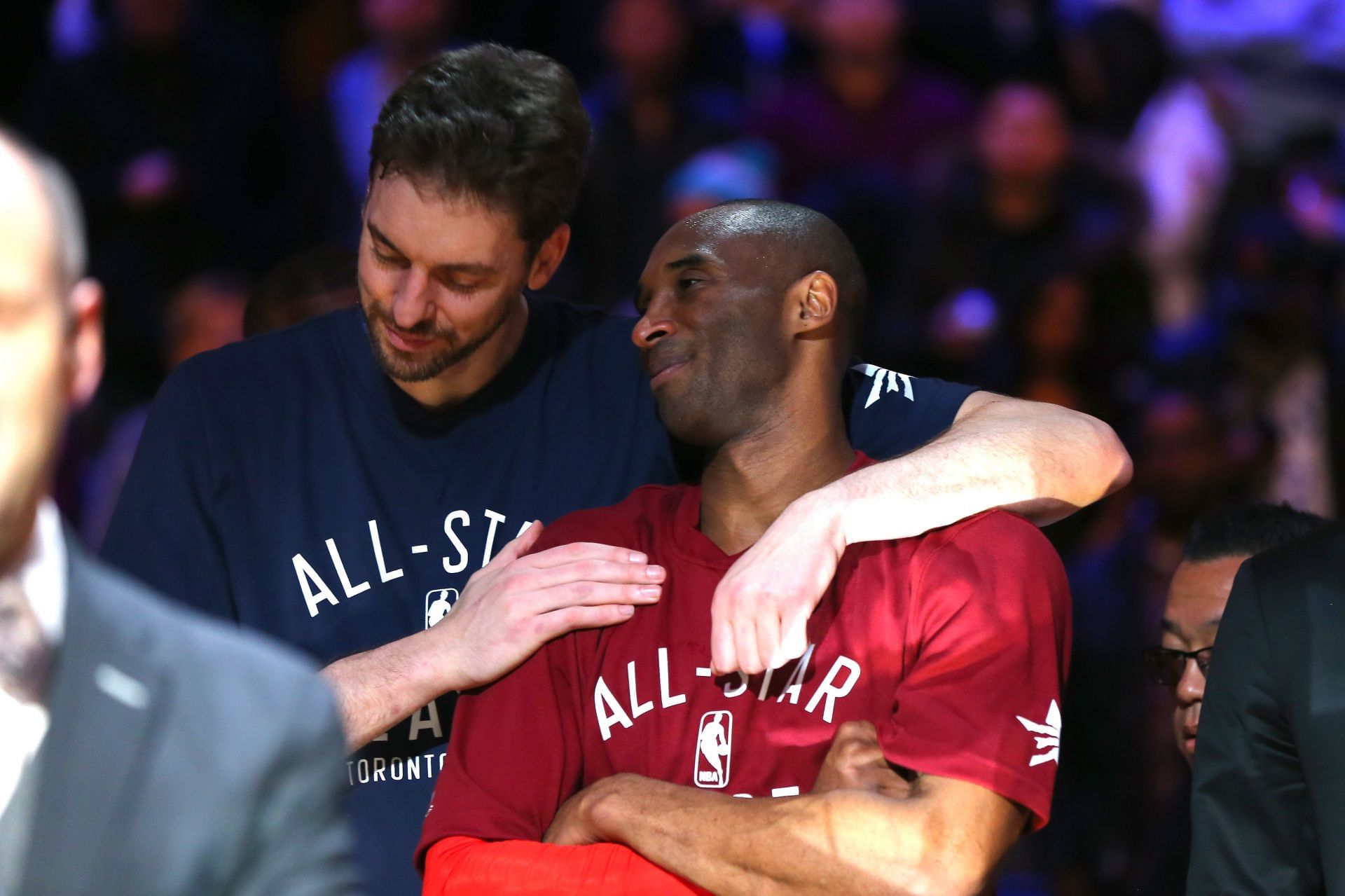
Walton:. “Kobe is one of the greatest players of all time. But he’s not easy to play with for everybody. He’s very demanding and he’s very competitive and intelligent. If you aren’t on the same page as him, it’s not going to be a lot of fun and it’s not going to be easy. It was always interesting, whether it was a role player or a talented guy to see how they were going to mesh because that was Kobe’s team. It’s the combination of their skills and more importantly the way they saw and understood the game of basketball. That allowed them to pick defenses apart to create easy opportunities for each other.
Vitti: “Pau was the perfect accompaniment for Kobe. Kobe even said this himself that after Shaq left, he did not want to play with a dominant big man. Pau was kind of a dominant big man without being a dominant big man. He wasn’t this big giant forceful threat in the post like Wilt Chamberlain, Kareem Abdul-Jabbar and Shaquille O’Neal. But Pau was a great low-post player. He could score with either hand from either side of the block. He had a brilliant vision for the game. He was a great passer. But Pau was the perfect accompaniment for Kobe because he didn’t need to be the center of attention. But the ball had to go through him as an in-and-out player. He made everything happen so that Kobe could be Kobe. Once Kobe realized that, that’s when things really started to click.”
What was the dynamic between Kobe and Pau like?
Gasol: “What I tried to do was complement him; really provide as much as he needed and the team needed at the time. I had to evolve as a player to be better, in order to be that second great player of the team, and I put my mind and effort and heart into it to do that. To make three straight Finals is not easy to do. So I tried to complement him. We connected on an intellectual level, too. I tried to catch the passes that he would throw my way, and make plays with both hands. That’s what the team needed. That’s what he expected of me, and that’s what I wanted to provide.”
Walton: “You take the personal out of it. You understand that everything is coming from a standpoint on how are we going to win a championship. I think when that is the ultimate goal, which it was for that group of guys, you can speak to each other in a manner that might be uncomfortable or might cause a rift on other teams. But for us, we had one goal. We respected each other. Those two respected what they brought to the table. They both realized they needed each other if we were going to win a championship. When that’s the case, it’s like being in a family. You say stuff to your loved ones. But you know at the end of the day that you guys have each other’s backs and want to try to get something done. It never got to a place where this thing can’t work.”
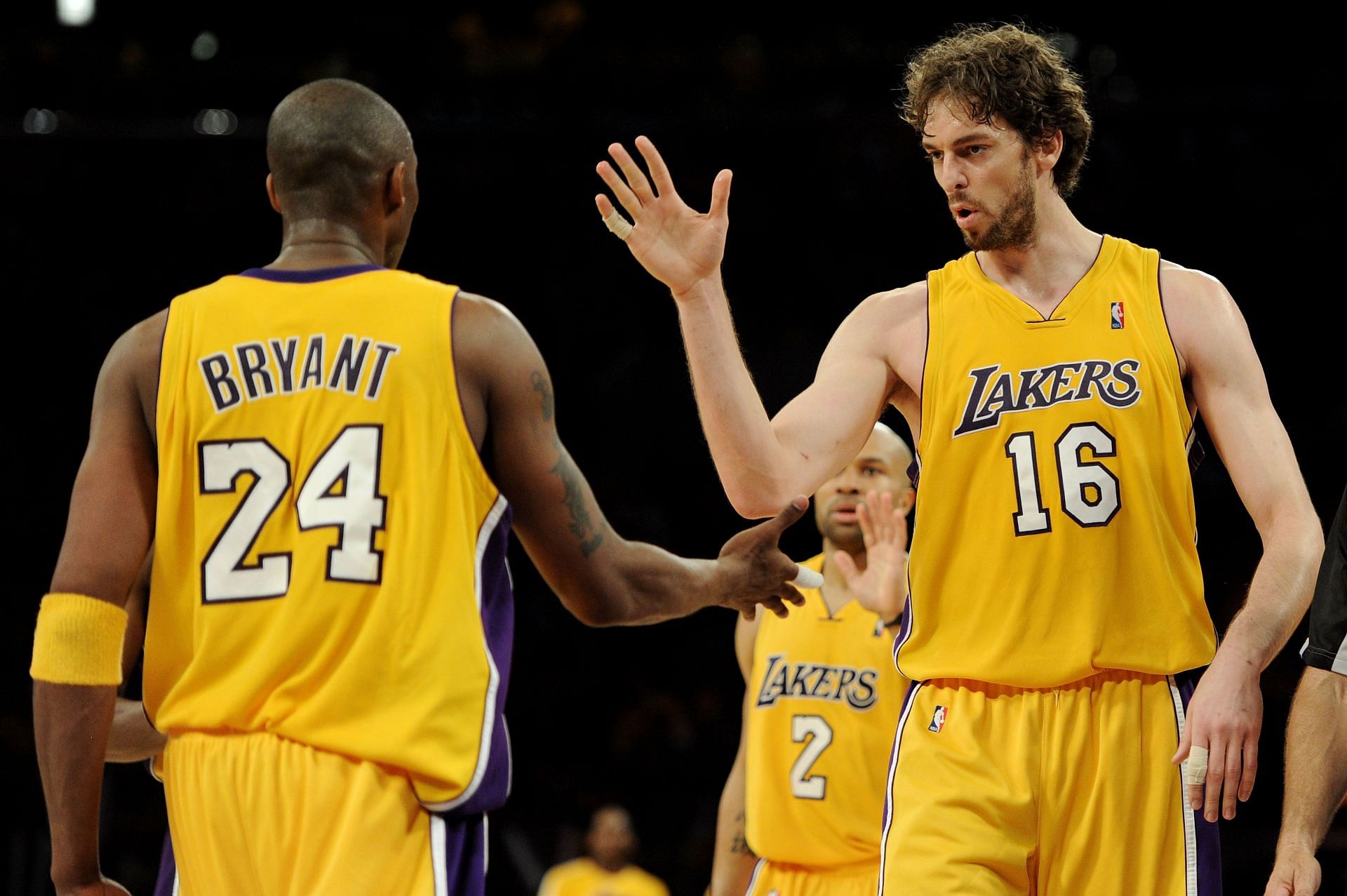
Kupchak: “I thought Phil did a great job with keeping the team happy at each position. Kobe was hard on his teammates. He pushed them. I know with Pau, I felt at the beginning, Kobe was particularly hard on him. Kobe wanted to win. He realized that this was how he was going to win. Pau was younger and hadn’t been through the wars of the playoffs and didn’t know what to expect. In Kobe’s mind, he didn’t have forever. He wanted to get this done now. So he pushed Pau and drove him. Initially, it was hard on Pau. But ultimately, they ended up having one of the best relationships ever.”
Vitti: “It took a while for Kobe to figure out that Pau could help him in the way that Pau could help him. It’s not the way that Kobe would’ve played the game if he was in Pau’s body. If Kobe was seven feet tall, he would’ve been this vicious competitor. Pau wasn’t like that. He was a competitor. He just did it in a different way. Pau wanted to be the best that Pau could be. He just did it in a different way.”
What do you remember about Gasol’s performance in Game 7 of the 2010 NBA Finals against Boston?
(Gasol finished with 19 points, 18 rebounds and four assists)
Gasol: “It was one of those moments and day that I’ll never forget. It’s a day that is historical and epic. I was lucky to be a part of it. When I try to look in the mirror and think about the moments in my life, that is a day I felt like I gave the best that I could to help my team win. I contributed to the growth and legacy of the Lakers. It’s all of those beautiful things that are beyond myself.”
Kupchak: “That was not a game that was won with enormous amounts of skill. Nobody shot the ball well. Nothing was going in. Everybody was getting fouled. The referees weren’t calling anything. It was a low-scoring game. If it would’ve been in Boston, maybe it would’ve been different. But it was at home."
"Pau just willed his way. Pau and Kobe led the way, and Metta [Sandiford-Artest] made those key shots. But it wasn’t one game where one guy shot the ball incredibly well. It was a hard game. If you weren’t a basketball fan, you might say, ‘This is not good to watch.’ But being a basketball fan, you can just see how hard they’re playing. They have the will to win. I can certainly name several that played well. But Pau was certainly at the top.”
How did you see Pau handle the aftermath of the nixed Chris Paul trade?
Buss: That was a very frustrating time, certainly for our entire organization. At that time, my dad was nearing the end of his life with his illness. It was a difficult time. I don’t know how things could’ve gone differently. When you look back at it, I wondered what would’ve happened if Phil would’ve come back for another run [in 2012]. Obviously, he didn’t.”
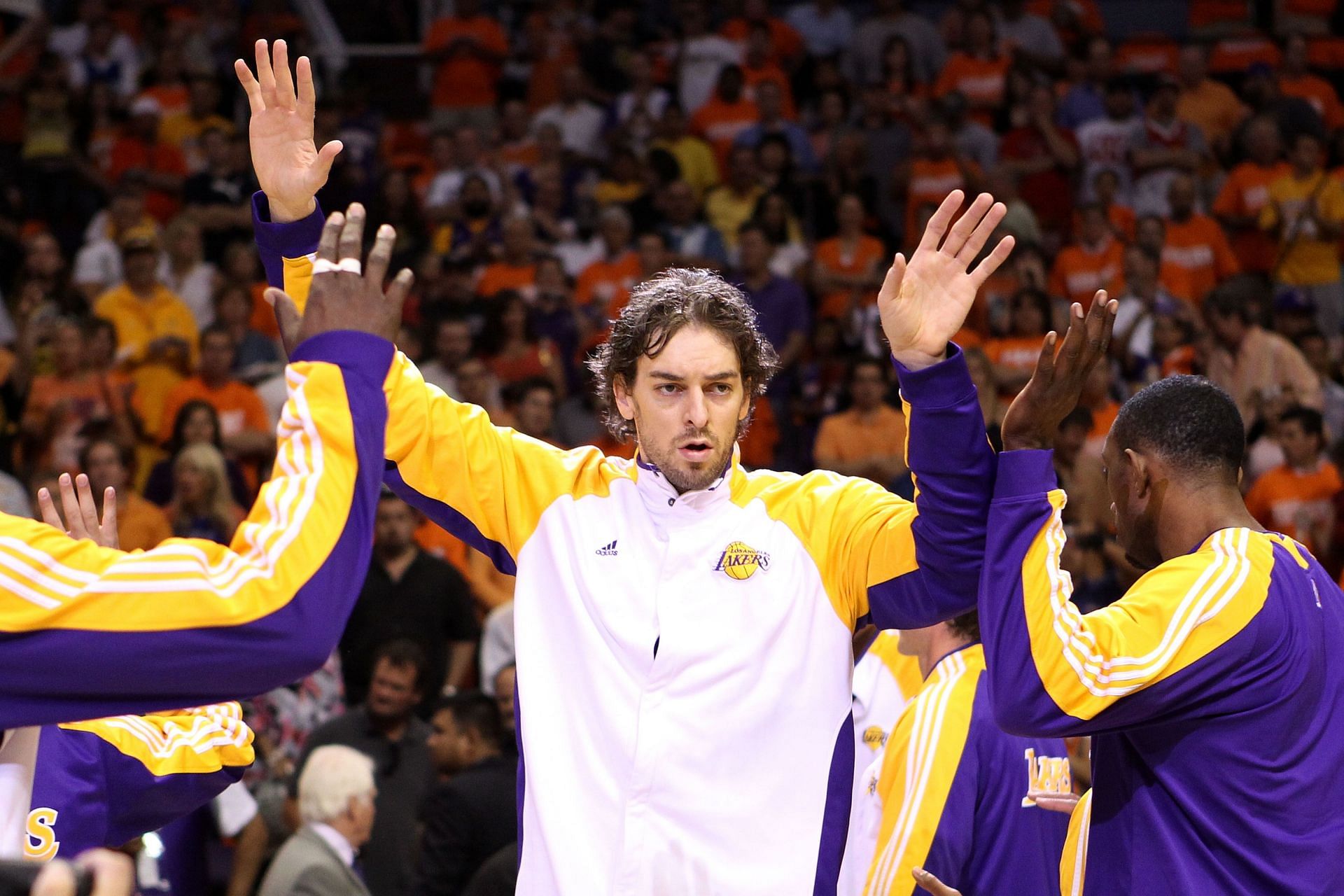
Kupchak: “I would have regularly scheduled lunches with Dr. Buss. He always wanted to be one step ahead. He always talked about, ‘If we’re going to make a trade, it’s better to make it a year too soon than a year too late.’ Those are really hard things to do, those kind of decisions. We had gotten beaten in Dallas [in the 2011 Western Conference semifinals]. We were getting older. This was a way to inject a young All-Star. It was a hard decision. But Dr. Buss always tried to stress, ‘Rather than wait a year or two too late, it’s better to go a year too early.’”
It was tough when the trade was rescinded or undone. Both Lamar [Odom] and Pau were brought back to the Lakers. I’m sure, in their minds, it was bad enough that they had been traded. But now to come back, it was very difficult. Much more so for Lamar. Pau worked his way through it. He got through it. But I’m sure he never forgot it. Then when he became a free agent, we tried everything we could to try to bring him back and he chose to leave. I’m sure in the back of his mind, it would’ve been nice if he ended his career as a Laker. But he ended up going to Chicago. But certainly for him to be in the Finals three years in a row, without Pau Gasol, that’s not happening.”
Vitti: Lamar Odom and Pau Gasol both felt betrayed by that. They both sacrificed parts of their game to make the Lakers successful. Then we turn around and trade him. Lamar never recovered from it. Pau was equally hurt by it, but was much more professional about it. We probably had his best years. After that, he suffered some significant injuries. But Pau Gasol was the ultimate professional with all the hits that he took.
Walton: “After we lost [to Dallas in the 2011 Western Conference semifinals], a lot of us felt like we still had another run in us. We had just gotten accustomed toward going to the Finals and didn’t realize how hard it was to actually get there. But that next year is where a lot of us got traded out of there and they started going in another direction. I didn’t see a lot of that. But anytime we played against Pau that next year or coached against him in the future, we’d meet up and go to dinner and he was the ultimate teammate. He would sacrifice some of his personal stats or shots to help the team win. That’s ultimately, at least when he was with us, all that he cared about. It’s never easy to do that, especially when you’re a Robin to a Batman and you have a certain skillset that Pau had while also having to play that second role. He just came in and tried to be an awesome and supportive teammate and make huge plays and allow us to win back-to-back championships.”
Brown: “He handled it well. Pau was a huge part of our success [getting to the second round]. I enjoyed my time with him. I thought at that point, he still had a lot left in the tank.”
How did you see Gasol adjust to different roles under Mike Brown (2011-12) and Mike D’Antoni (2012-14)?
Brown: “Pau is so skilled that you didn’t have to feature him. He was going to find a way to get it done. He can get it done passing the ball, shooting the ball or posting up. The thing I was most excited about when I took the job besides Kobe and Pau was Lamar Odom. His versatility allowed Pau to really shine. You could play Pau at the power forward with Andrew. But you could also play Pau at center with Lamar, and you were still long and big. With Pau at center in certain matchups, he was a nightmare. With us trading Lamar, I thought it took away the versatility of the team. It also took away some of Pau’s ability to shine in crunchtime at that center spot.”
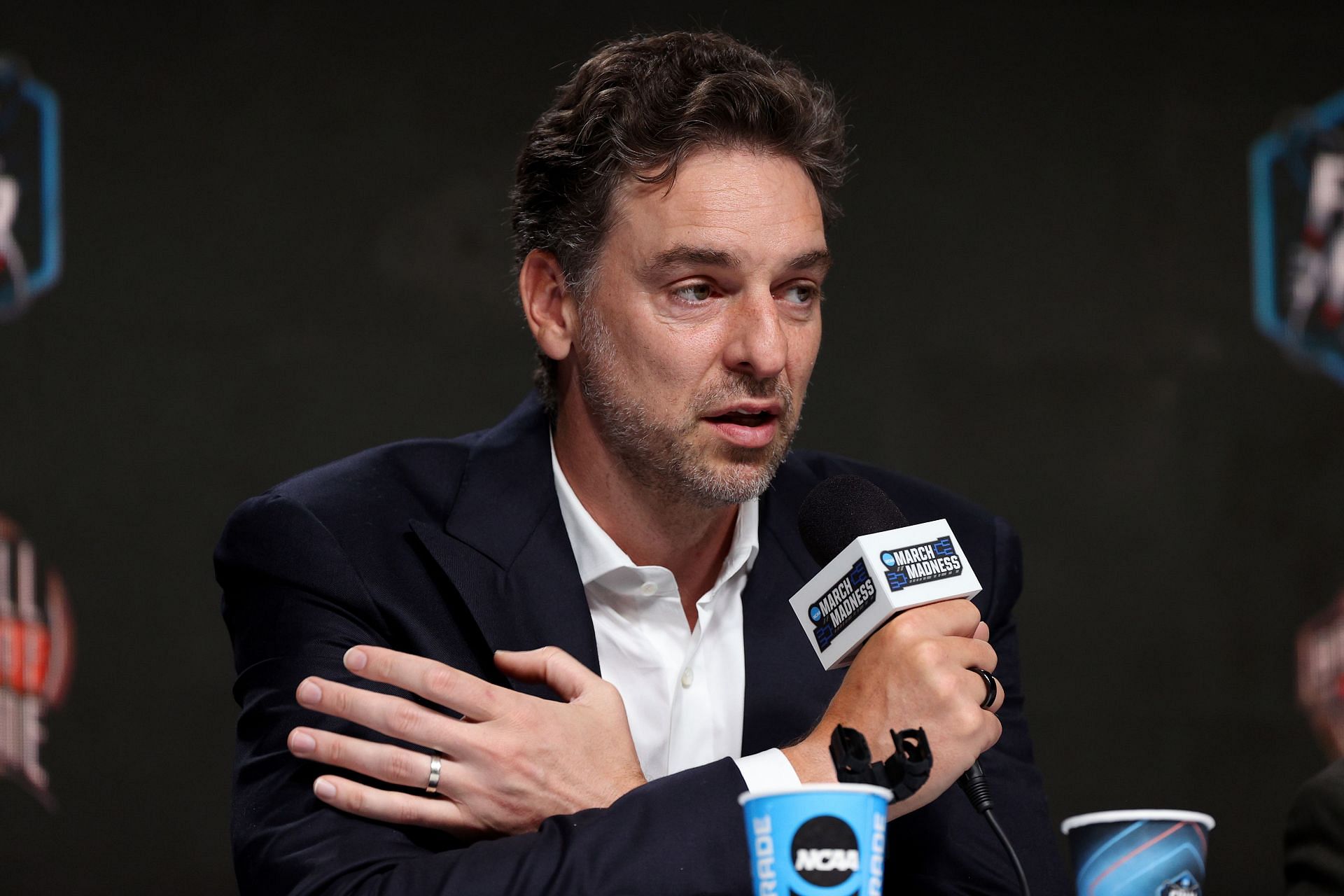
Kupchak: “With Phil, the offense was tailor-made for him and Kobe. The players bought in. When we made coaching changes, each coach brought their own style. They didn’t run the triangle. Mike D’Antoni looked at the game differently. Mike Brown looked at the game differently. In particular with D’Antoni, Mike was encouraging Pau to go to the corner and start shooting 3s. Pau was kind of like, ‘That’s not my game.’ I think initially he resisted. But then soon enough, he was out there shooting 3s as much as his brother was. The game was beginning to transition from the game that was being played 15 years ago to the way the game was played now. D’Antoni in Phoenix and George Karl lived the charge. But we weren’t there yet. It was an adjustment.”
Buss: “Pau wasn’t a player that fit into the kind of style of play that Mike D’Antoni wanted to play. That’s where you’re not on the same page and your roster can’t adjust quickly enough to what Mike wanted to do. That was an observation I had with how Phil saw the game and saw how an organization needs to be built. Mike Brown, who was a great coach, left. Then Mike D’Antoni came in, that’s two very different styles of play. A roster in the NBA can’t change quickly enough to give a coach a real chance to make his mark in 18 months. When you’re changing coaches that quickly, it’s really difficult to be successful. When Pau left as a free agent (in 2014), that was his choice to do. He felt he had a better opportunity to go someplace else. It was hard to see Pau go. But that was the next step in his journey.”
Vitti: “As much as I like Mike D’Antoni as a guy, he really took Pau out of the spot that he was best at. That is in the low post. He could go down in the block and really excel. Then, Mike D’Antoni brings him up to the elbow up at the free-throw line. That’s where Pau started to play. That wasn’t his strength. But Pau was such a professional. He didn’t complain. He did what he was asked to do. And he did it well even though he was frustrated playing the center position from the pinch post and not the low post. He took the hit for the team.”
How did you internalize all the complex emotions with Pau’s jersey retirement ceremony: Celebrating Pau and what he meant as a Lakers and seeing him as well as wanting Kobe to be there because of what he meant to you, the Lakers and to Pau?
Buss: “It was emotional. It was very emotional for Pau. The fact that Vanessa Bryant was there to participate meant a lot to me personally as well as to Laker fans and, of course, to Pau. I felt like Kobe was in the building. It was Pau’s moment to celebrate his career. But we all felt a little bit closer to Kobe. That was a nice feeling.”
Vitti: “I think in many ways, Pau wanted Kobe’s approval. You’d have to ask Pau. But for many us in pro sports, sometimes it’s not just about winning. But it’s about winning the approval of the people that you look up to and admire. For me, it was Pat Riley and Jerry West. They meant more to me than probably anything. They thought I was worthy of the job that I was hired to do because it was a special job on a special team.
I don’t want to put words in Pau’s mouth. But having been there, I think that Pau really wanted Kobe’s approval. That would’ve been the day in Crypto on that night that they retired his jersey. If Kobe was there, he would’ve said the things that should’ve been said by him. That was the missing link there. Now it’s going to happen again at this Hall of Fame. Kobe should’ve been the guy that inducts him.”